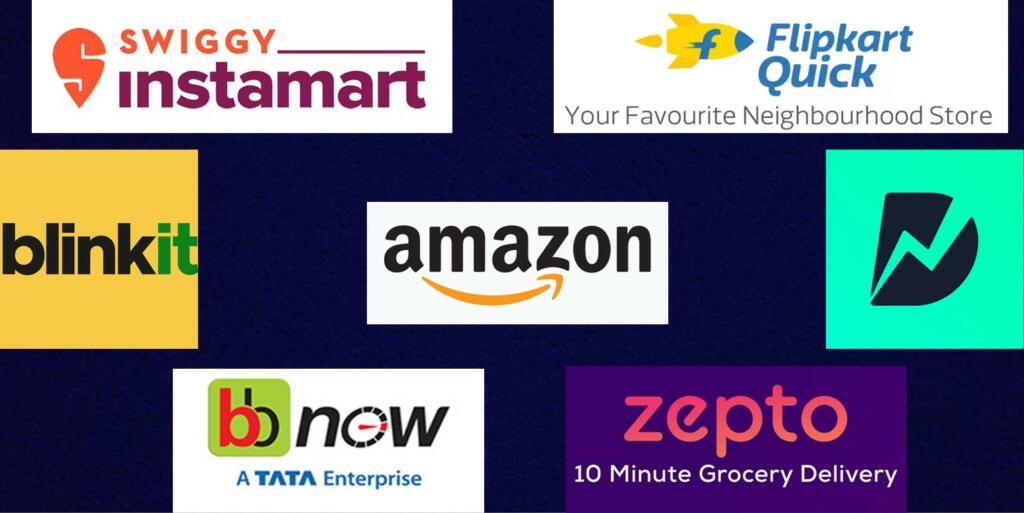Change is the only constant. The phenomenon is more exacerbated in a world full of electronics. Earlier big changes used to take decades to replace the existing structures. Now structural changes take barely 5 years to make their impact. Quick Commerce is one such change that is emerging as a replacement for E-commerce.
iPhone in few minutes
If you are one of the few lucky individuals who can afford to spend Rs 80,0000 on a whim, while residing in the mega cities of Mumbai and Delhi, you would only have a few minutes to wait for the latest version of the iPhone. Blinkit, a Quick Commerce company owned by Zomato, will now deliver iPhone series phones like iPhone 14, iPhone 14 Plus, iPhone 14 Pro, and iPhone 14 Pro Max at your doorsteps, in minutes.
Announcing the tie up for faster iPhone accessibility to consumers, Blinkit founder Albinder Dhindsa tweeted, “iPhone 14 in minutes! We have partnered with @UnicornAPR to bring Apple iPhone and accessories to Blinkit customers within minutes. Available in Delhi and Mumbai for now. Update to the latest @letsblinkit app version on your iOS and Android phones to buy.”
iPhone 14 in minutes!
We have partnered with @UnicornAPR to bring Apple iPhone and accessories to Blinkit customers within minutes. Available in Delhi and Mumbai for now. Update to the latest @letsblinkit app version on your iOS and Android phones to buy. pic.twitter.com/EjhQ2GFY9A
— Albinder Dhindsa (@albinder) September 16, 2022
Quick commerce as an alternative of E-commerce
The latest move by Blinkit, formerly known as Grofers, has helped shelve the negative sentiments around the future of the Quick Commerce segment. The segment is quickly emerging as a preferable platform by the consumers to get the products they like in an able and efficient manner.
Apparently, there is a big reason behind them taking up the market share of e-commerce companies in online delivery. Incidentally, this is the same mechanism through which E-commerce companies established their dominance, taking up vast amounts of business dominated by brick-and-mortar shops.
Modernisation is giving it a push
As India has started to take up its deserved space in the Asian Century, consumer spending is also on the rise. More and more people are flocking towards cities. While in 2017, only 45 crore Indians used to live in urban areas, the number jumped to 50.6 crores in 2021.
Even the villages are quickly getting modernised due to the Modi government’s push towards increasing the penetration of roads. The rapid modernisation and onset of the hypercompetitive job market is leaving people with not much time to spend on buying stuffs by visiting market.
Quick Commerce is source of instant happiness
This phenomenon was observed in the early 2010s as well, when E-commerce took advantage of the situation. Now, even their timing is too much for the people who are joining or re-joining the job market after the pandemic. Government’s emphasis on business creation in post pandemic world is leaving people with more money but less time to spend it. Despite giving their best, these E-commerce companies are not proving to be good enough for them.
That is how they ended up creating space for Quick Commerce. At the time when E-commerce companies are delivering products in time ranging from 24 to 168 hours, the new entrants said that they will deliver the same stuff in 15 minutes. Imagine the relief and instant dopamine which the customer got by listening to the promise. The companies started with delivering fresh as well as packaged food in the beginning and have now delivered products in the category of pharma, fashion, cosmetics and electronics.
Prospects in India
India is, in fact, a global leader when it comes to penetration of Quick commerce in the online delivery segment. In India, 13 per cent of total grocery delivered online is done through Q-Commerce. The total market size of Quick Commerce is projected to grow by 15 times, clocking at $5.5 billion in 2025.
This is a conservative estimate, since the size of the addressable market is $45 billion. This will grow by leaps and bounds as the transport network expands all across India, thanks to the introduction of National logistics policy.
Big Boys have entered the club
To take advantage of the opportunity, the companies are gearing up as well. These include both the established ones as well as startups. Currently the segment is mainly occupied by Swiggy (Instamart), Zepto, Dunzo, and Blinkit. Even the big ones are entering the space with Amazon, Flipkart, and Tata-backed BigBasket.
BigBasket is offering quick delivery through ‘BB Now’, while Flipkart has now named its Quick delivery service as’ Flipkart Quick’. The key players of these big boys’ club are offering delivery in the time period ranging from 15 minutes by BigBasket to 2 hours by Amazon.
By the end of 2025, India will have more than 90 crore Internet users. A large section of these users would want quality products from the choice of their shops. This is where the local inventory stores created by Quick Commerce companies will prove handy for them. It will only be a matter of packing and dispatching things to the area within a few kilometres of range.
Support TFI:
Support us to strengthen the ‘Right’ ideology of cultural nationalism by purchasing the best quality garments from TFI-STORE.COM.
